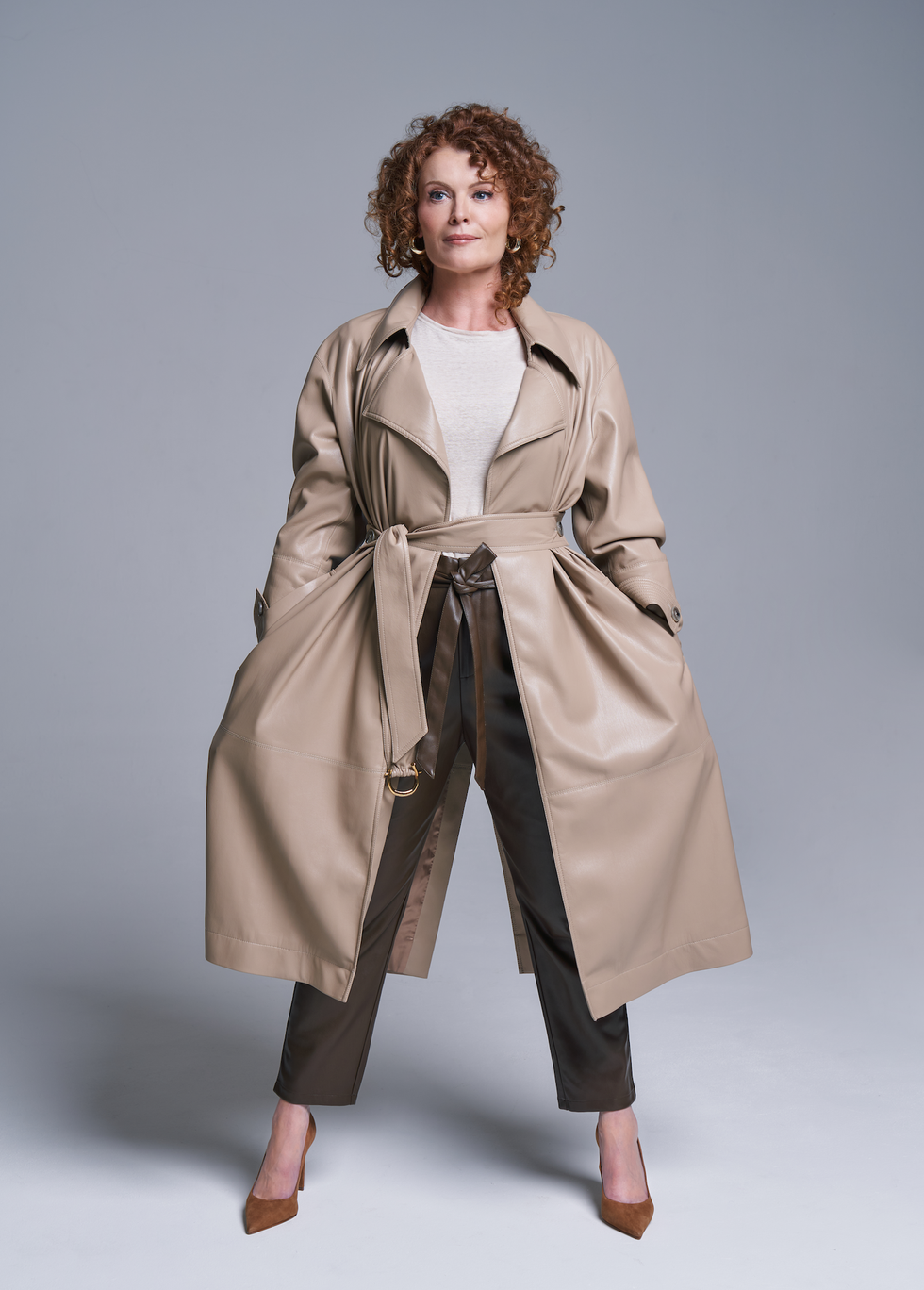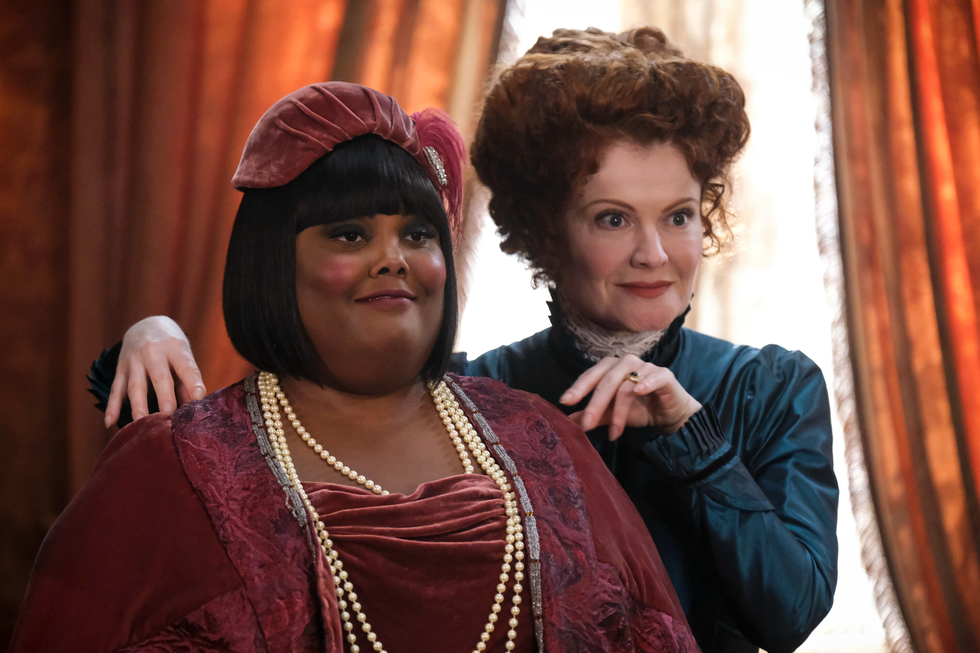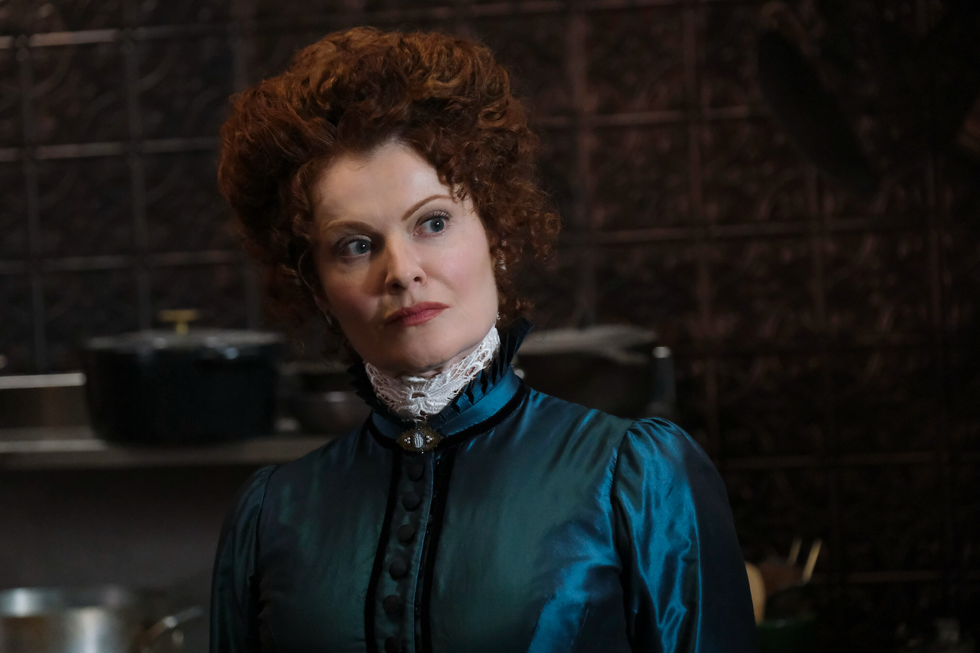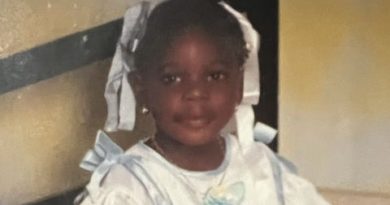Ghosts’ Rebecca Wisocky on the ‘Beautiful Human Frailties’ of the Season 2 Finale
Spoilers ahead for the Ghosts season 2 finale.
Rebecca Wisocky—or, as she’s better known in the gleefully clever CBS comedy Ghosts, Henrietta “Hetty” Woodstone—knows the responsibility on her incorporeal shoulders. As the Woodstone property’s lady of the manor, she’s something of a matriarch amongst the gaggle of friendly ghosts that populate the upstate mansion inherited by Samantha (Rose McIver) and Jay Arondekar (Utkarsh Ambudkar). But Wisocky understands that this responsibility is twofold: As Hetty learns how to better care for her unexpected housemates, so, too, does Wisocky better learn how to characterize Hetty herself.
A relic of the Gilded Age who died of as-yet-undisclosed causes, Hetty is emblematic of the prejudices of her class, race, and era. She dresses only in her full corseted gown and heels; she’s stiff and alarmed at any thought of sexual “impropriety”; she’s selfish and openly judgmental, especially at mention of the Irish. But, over the course of season 2, a few chance encounters with a washing machine and a deepening relationship with the other inhabitants—in particular, Alberta (Danielle Pinnock), Flower (Sheila Carrasco), and Trevor (Asher Grodman), as well as her distant descendant Sam—open her up to the idea of pleasure, passion, and even the capacity for change.
More From ELLE
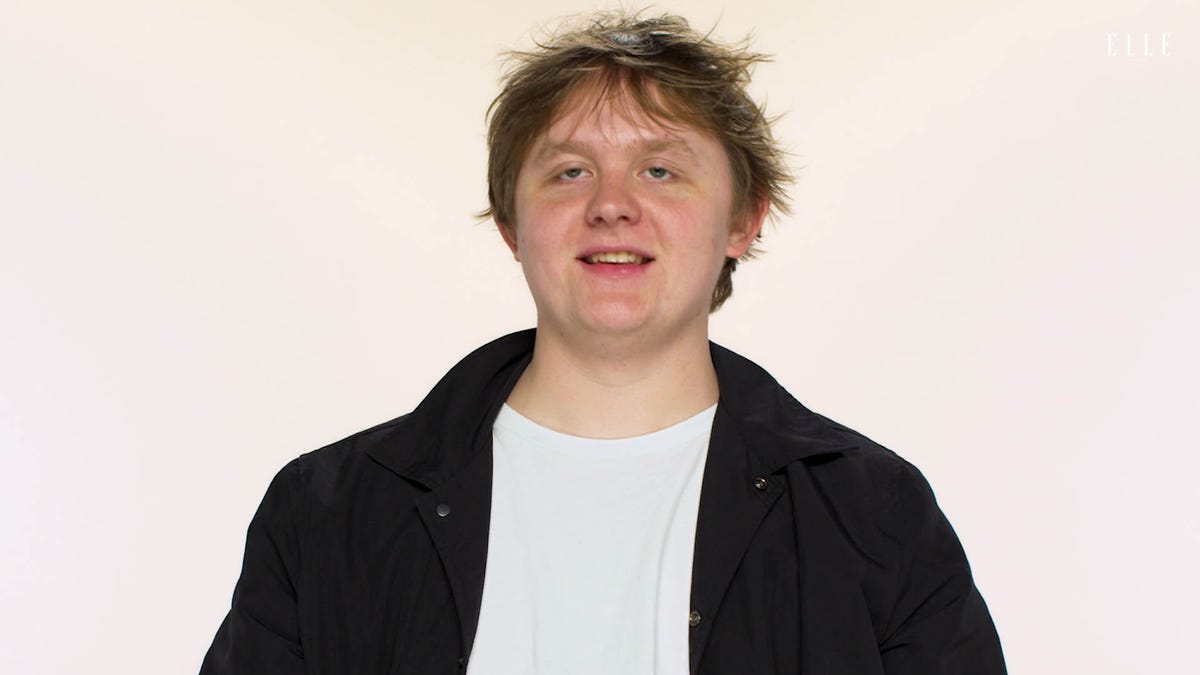
In last night’s season 2 finale, the culmination of the multi-episode mystery over Alberta’s murder ends with Hetty actually admitting wrongdoing. Her son, Thomas, was the culprit, and she covered up his crime for decades, openly lying to her friends—and to Alberta, in particular. She is uncharacteristically contrite as she stands “trial” for these crimes, which banish her to the forest surrounding Woodstone for a year. (“In the winter, I shall take shelter in the old outhouse we reserved for the help and for foreign-born guests,” Hetty replies.) But Alberta steps in at the last moment, swapping the harsh sentence for a lesser, funnier one: Hetty will now have to share a room with Flower.
As Ghosts readies itself for season 3—which, hopefully, will address who was “sucked off” (a.k.a sent to heaven) in the finale’s cliffhanger—Wisocky chatted with ELLE.com about embodying Hetty’s contradictions, supporting the writers’ strike, and brainstorming for Ghosts’ next chapter.
A lot of season 2, in terms of Hetty’s character arc, has focused on her self-exploration and self-pleasure. So I thought it was fascinating—and endearing—that the finale ultimately ends with what Hetty’s willing to sacrifice for her friends. I’m curious what you thought about that development.
Yes, you are right. Hetty’s not a woman that has a lot of experience being contrite or apologizing. We realized that that was the way the plot was twisting just before we shot it. I did a lot of reverse engineering about what might make this particular woman be able to carry that secret for so long. It had a lot to do with preserving the feeling for someone else. I think she has a great capacity for a friendship, and she just expresses it in all the wrong ways. There’s so many little beautiful human frailties that our writers manage to express in what is essentially a very silly romp of an ensemble comedy. We’re very grateful to have such skilled writers to do that and want to take us on those journeys.
But the idea of telling a lie and keeping it for so long that it becomes your truth is twisted and something that I think Hetty became capable of. But I think there’s any number of things that she would be willing to prostrate herself and do in order to win Alberta’s friendship back. I think the writers will expand what that means into season 3.
What is it about the relationship between Alberta and Hetty that you think draws them to each other? Apart, of course, from the fact that they live in the same house and, y’know, the murder connection.
I’ve thought a lot about this. One thing that’s important to me about the show is the way that [showrunners] Joe Port and Joe Wiseman have chosen these archetypes of characters from certain periods in American history. They all seem to be from rather fraught periods in American history—and with the women, that’s certainly true. None of these characters would’ve been exposed to one another, to one another’s points of view and opinions, in their own time, in their own lives. But being so in this show, they’re actually capable of change.
In particular with the relationships with the women, the story of the suffrage movement, the story of the right to vote, the story of female empowerment and sexual awakening—all those things are lessons that Hetty learns based on her friendships with these other women. It’s not lost on me that, if Alberta died in 1920, when she discusses and teaches [Hetty] the importance of the right to vote, Black women did not have that right at that time. Not until the Civil Rights Act and in Flower’s time did they have that. There’s smart, insightful, provocative historical things and themes that the show allows us to explore.
Hetty says in the finale, when she is apologizing to Alberta, that in her time, “women were competition for one another,” and that she no longer sees them in that way. I was curious, do you think that that’s really true? Has her view of women changed that much over the course of this show?
I think her view of women has changed because her view of herself has changed, based in her relationships with these other women. Kicked off, of course, by Rose McIver’s character. I think these people have been trapped together in a house—for some of them thousands of years, hundreds of years at the very least. Suddenly, now, only in the last two years are they seeing all this change. There’s this renaissance happening in the house, and it’s because they have access to this new character who is a Living. Things seem possible; things seem changeable.
Absolutely. Because you mentioned Rose’s character, how would you like to see the relationship between Sam and Hetty evolve? I was thinking of that little moment in the finale when Sam seems like she might lose the house and Hetty says that line, “Just when we finally got a Living that could serve us—see us.” I thought that was such a wonderful, hilarious little look into their characters. But given that, how would you like to see that dynamic evolve in season 3?
Well, they’ve already evolved so much…We’ve met Sam’s mother; we know that that was a difficult relationship. I think that Hetty—we don’t know yet whether or not she had a daughter. But she certainly had a difficult relationship with her own one child that we know about, and so I think they’re seeking something in each another, I think, that will continue to evolve.
What would you say is the most challenging aspect of balancing the humor of this show and the sheer ridiculousness of the premise with the insightful emotional stakes that you mentioned? Especially in the case of Hetty, who I think could easily come across crass if you didn’t toe the line as well as you do.
Well, thank you for the compliment. It is definitely a delicate line. Respect must be paid to the writers, who have that all in mind by design. I would say it’s tricky, but it’s also a great gift.
You remember that these ghosts are all, in many ways, a bunch of children. They’re creatures who can really love Sam, and they would’ve been horrified to see her go. But at the same time, the ramifications for them are that they won’t be able to watch television constantly. The selfishness and those things are very funny, I think they’re very relatable, but then they also own balance with these very connected moments of relationship and family. Let’s be honest, family are the ones that you tend to, sometimes, treat the worst. Our family is like that, too.
As we go into season 3, how do you think this new roommate situation between Hetty and Flower is going to change their relationship?
I can’t wait. I love those two together. I love Sheila Carrasco; I love working with her. One of my favorite storylines of season 2 was the washing machine episode early in the season. I just think, again, there’s so many unlikely partnerships [in Ghosts]. The romance [between Hetty and Trevor] is certainly one of them, but the friendship between Flower and Hetty, I think, is going to be a lot of fun. Sheila and I text each other all the time, various scenarios that Hetty and Flower would get up to: We play hide and seek, but then Flower forgets to seek.
Do you think that Hetty is becoming less prejudiced as the series goes on, or is it simply that she’s more aware of what constitutes a prejudice?
I think it’s both. I really do. Again, it’s a nice way that our show manages to be a light comedy but also a bit provocative and a little subversive with the pokes that it gets in. Hetty’s disdain for the Irish was not an uncommon sentiment in America in the 1800s. There’s obviously a horrible history in America of anti-immigrant sentiment, and so she represents that. She’s allowed to represent that and that they can do that and bring truth to it, but also some humor to it, I think is impressive.
Do you know who it was that got “sucked off” in the season 2 finale?
I do know. I am not going to say anything more lest you read into my tone of voice any clues.
You’ve mentioned several times throughout how much you and the cast and everyone involved in Ghosts owe to the writers. You’ve been a vocal advocate, on- and offline, of the ongoing writers’ strike. What compels you not only to give the writers as much credit in this conversation as you have, but to physically stand alongside them in their effort?
It’s a no-brainer. Without the writers, we would have no story. Like you said, I’ve been out there and there’s a tremendous amount of solidarity across mediums, and I think it’s really important. There’s a need for an equitable deal. And it’s, I think, emblematic of some of the larger problems in society, if I may be so bold.
It’s the transparency. I am 100 percent union strong and support the writers in getting a good deal.
What about the fan reception to Ghosts has surprised you, and what has it meant to you as an actress?
There’s such incredible love that has come, and creativity and community—the fan art that’s been generated, this sense of…We’ve gotten some really meaningful communication from fans about people being able to have conversations in their families that they wouldn’t have had. Delicate conversations. People being able to discuss death in a way or grieve a loved one in a way. Again, it’s a light comedy, but it has the capacity to incite conversation and community. That feels really, really rewarding.
There was a very, very strong reaction to Hetty and Trevor getting together, which actually did surprise me. I like that people felt a little challenged by that. It’s a May-December romance—I’m not just the older woman; I’m 150 years older. A lot of fans, they want Hetty to grow; they want her to change. They want her to be empowered; they want her to have a sexual awakening. But they weren’t sure if they wanted her to get with a young guy. A lot of those people have changed their minds, and I think ultimately they’re rooting for this character to evolve and be happy. But the sense of investment that people really have in us and in these characters has been really incredible.
This interview has been edited and condensed for clarity.
Photography by the Riker Brothers; hair by Vince Lowell; makeup by Marie Del Prete; styling by Joseph Casell.
Culture Writer
Lauren Puckett-Pope is a staff culture writer at ELLE, where she primarily covers film, television and books. She was previously an associate editor at ELLE.


